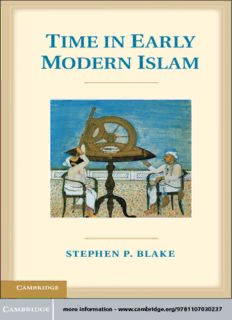
Time in Early Modern Islam: Calendar, Ceremony, and Chronology in the Safavid, Mughal and Ottoman Empires PDF
Preview Time in Early Modern Islam: Calendar, Ceremony, and Chronology in the Safavid, Mughal and Ottoman Empires
TimeinEarlyModernIslam The prophet Muhammad and the early Islamic community radically redefinedtheconceptoftimethattheyhadinheritedfromearlierreligions’ beliefsandpractices.Thisnewtemporalsystem,basedonalunarcalendar andera,wascomplexandrequiredsophisticationandaccuracy.Fromthe ninth to the sixteenth centuries, it was the Muslim astronomers of the Ottoman, Safavid, and Mughal empires, andnot thoseof Europe, who wereresponsibleforthemajoradvancesinmathematics,astronomy,and astrology. Stephen P. Blake’s fascinating study compares the Islamic concept oftime,and itshistoricaland culturalsignificance, acrossthese threegreatempires.Eachempire,whilemindfulofearliermodels,created anewtemporalsystem,fashioninganewsolarcalendaranderaandanew roundofritualsandceremoniesfromtheculturalresourcesathand.The hysteriathataccompaniedtheendofthefirstIslamicmillenniumin1591 alsocreatedauniquecollectionofapocalypticprophetsandmovementsin eachempire.Thisbookcontributesnotonlytoourunderstandingofthe Muslimtemporalsystem,butalsotoourappreciationoftheinfluenceof IslamicscienceontheWesternworld. Dr.StephenP.BlakeisProfessorEmeritusatSt.OlafCollege,Northfield, Minnesota, and Senior Research Fellow, Center for Early Modern History, University of Minnesota. His books include Shahjahanabad: TheSovereignCityinMughalIndia,1639–1739(CambridgeUniversity Press 2002), and Half the World: The Social Architecture of Safavid Isfahan,1590–1722(1999). ToMeg,withloveasalways Tomychildren–Andrew,Edward,John,Paul,andRachel Time in Early Modern Islam Calendar, Ceremony, and Chronology in the Safavid, Mughal, and Ottoman Empires STEPHEN P. BLAKE CenterforEarlyModernHistory,UniversityofMinnesota cambridge university press Cambridge,NewYork,Melbourne,Madrid,CapeTown, Singapore,SãoPaulo,Delhi,MexicoCity CambridgeUniversityPress 32AvenueoftheAmericas,NewYork,ny10013-2473,usa www.cambridge.org Informationonthistitle:www.cambridge.org/9781107030237 ©StephenP.Blake2013 Thispublicationisincopyright.Subjecttostatutoryexception andtotheprovisionsofrelevantcollectivelicensingagreements, noreproductionofanypartmaytakeplacewithoutthewritten permissionofCambridgeUniversityPress. Firstpublished2013 PrintedintheUnitedStatesofAmerica AcatalogrecordforthispublicationisavailablefromtheBritishLibrary. LibraryofCongressCataloginginPublicationData Blake,StephenP. TimeinearlymodernIslam:calendar,ceremony,andchronologyinthe Safavid,Mughal,andOttomanempires/byStephenP.Blake. p. cm. Includesbibliographicalreferencesandindex. isbn978-1-107-03023-7(hardback) 1. Islamiccalendar. 2. Astronomy–Religiousaspects–Islam. 3. Time–Religious aspects–Islam. 4. Islamandscience–History. 5. Iran–History–Safaviddynasty, 1501–1736. 6. MogulEmpire. 7. Turkey–History–OttomanEmpire, 1288–1918. I. Title. ce59.b63 2013 5290.327–dc23 2012023174 isbn978-1-107-03023-7Hardback CambridgeUniversityPresshasnoresponsibilityforthepersistenceoraccuracyofurlsfor externalorthird-partyInternetWebsitesreferredtointhispublicationanddoesnot guaranteethatanycontentonsuchWebsitesis,orwillremain,accurateorappropriate. Contents Preface pagevii Acknowledgments xi NoteonTransliteration xiii Introduction 1 1 Safavid,Mughal,andOttomanEmpires 21 2 Calendar 48 3 Ceremony 76 4 Chronology:Era 107 5 Chronology:Millenarian 141 6 Conclusion 174 SelectBibliography 187 Index 193 v Preface As the last of the great world religions, Islam entered a crowded spiritual arena.AlthoughMecca,thehomeoftheprophetMuhammad,containedthe central shrine of the pagan Bedouins, it also housed sizable Jewish and Christian communities. As a result, an early aim of the new community wastodistinguishitselffromthebeliefsandpracticesofitsneighbors.And one of its most radical departures wasa thoroughgoing redefinition of the conceptoftime.IntheQuranAllahhadordainedanewcalendar.Theyear wastobestrictlylunar,354days,dividedintotwelvemonthsoftwenty-nine andahalfdayseach.Althoughmanyearlystateshadadoptedlunarcalen- dars(theBabylonians,Egyptians,Jews,andGreeks,forexample),theireras werelunisolar.Thatis,inordertokeepthecalendar(anditsceremoniesand rituals) in rough synchronization with the seasons, these states added an extramontheverythreeyearsorso.However,becauseAllahhadexpressly prohibitedathirteenthmonth,thestrictlylunareraoftheMuslimscontained no lengthened years. Rather, the 354-day year of the lunar era regressed againstthe365-dayyearofthesolareraattherateof11dayspercycle.In thuscuttingthecalendarloosefromtheseasons,thenewreligiongavebirth toanintensepreoccupationwithtime–definingit,measuringit,celebrating itspeakmoments.IntheyearsafterMuhammad’sdeaththeintroductionof newritualsacceleratedtheprocessofredefinition.Amonthoffastinganda pilgrimage month required a precise determination of the phases of the moon, and the five daily prayers demanded an accurate timetable of the sun’smovementacrossthedaytimesky. Becauseinthepremodernworldtimewasmeasuredbythemovementsof theheavenlybodies(theearth,sun,moon,thefivevisibleplanets,andthe vii viii Preface visible stars) and not by mechanical devices (clocks or watches), the new temporal system created a new dedication to astronomy. In premodern Eurasia,astronomywasthequeenofthesciences,reaching(accordingtoa modernhistorian)“amuchhigherlevelofaccuracyandsophisticationthan any other science.”1 And from the middle of the ninth century until the middleofthesixteenthitwastheIslamicastronomersintheobservatoriesof Isfahan, Maragha,and Samarqand,notthose inParis,London, orRome, whoachievedthemajoradvancesinthescience.NotuntilTychoBrahein thelatesixteenthcenturydidtheEuropeansmatchtheequipment,precision, andmathematicalsophisticationoftheIslamicastronomers. In the premodern Islamic world, the astronomer/astrologer (Persian, munajjim; Turkish, muneccim) was the time expert. Not only was he responsibleforestablishingtheobservationalandmathematicalparameters ofthenewtemporalsystem,buthewasalsogiventhetaskofworkingoutits astrologicalcomponents.Althoughastrologyalsodefinedatemporalorder dependentontheheavenlybodies,itwasacompletelyunscientificconstruct. The time of the astrologer was symbolic, eschatological, and millennial. Having constructed a horoscope or chart of the heavens, the astrologer foretold the future for individuals, communities, and nations. He deter- mined the appropriate time for undertaking or avoiding activities. He revealedthehiddenpatternsofthecosmos–theeclipsesandconjunctions, thecometsandshootingstars–thatpredictedthetriumphsanddisastersof theterrestrialworld. By the early modern period, three great empires had come to rule the Islamicworld–theMughal(1526–1739)inIndia;theSafavid(1501–1722) inIran;andtheOttoman(ca.1289–1923)inAnatolia,theBalkans,Syria, Egypt, the Arabian Peninsula, and North Africa. Although all three had inherited the basic Islamic concept, their different cultural environments (IndicfortheMughals,ZoroastrianfortheSafavids,andChristianforthe Ottomans) meant that in each state different temporal systems emerged. Thesesystemsvariedinthreeways–calendrically,ceremonially,andchro- nologically.Thecalendricaldifferencerevolvedaroundtheadditionofone ormoresolarcalendarstotheliturgicallunar,thenecessityinanagrarian stateforacalendarthattrackedtheseasons.Theceremonialdifference,by contrast,centered on the adoption of new public rituals,celebrations that reflectedboththedynasty’sheritageanditsneedforlegitimacy.Finally,the chronological issue was twofold: First, in an agrarian state with multiple 1 StevenWeinberg,“TheMissionsofAstronomy,”NewYorkReviewofBooks56(22Oct. 2009):19.
Description: